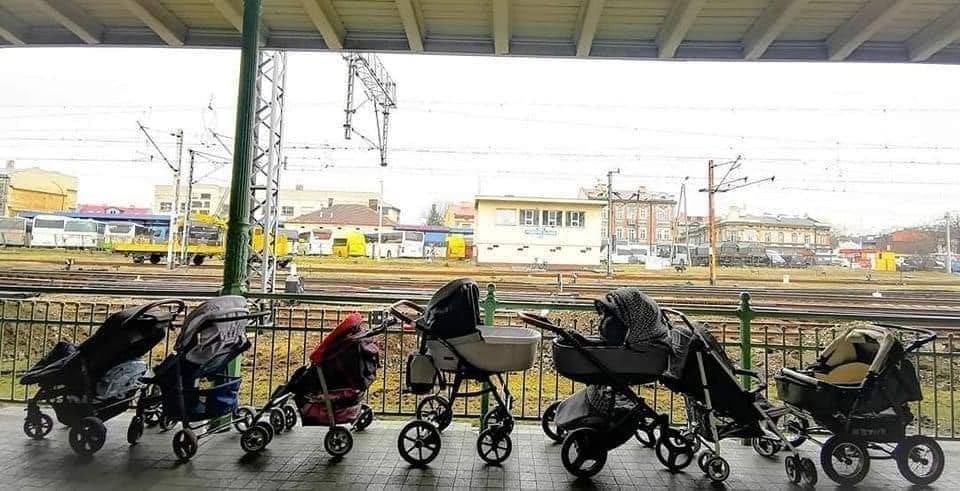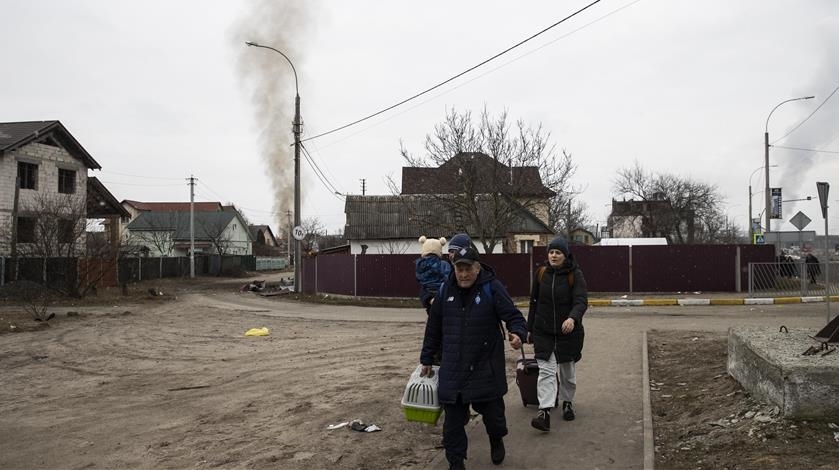China calls friendship with Putin ‘ironclad’ amid heavy fighting and claims 10,000 Russian soldiers are now dead

China’s foreign minister has called Russia his country’s “most important strategic partner” as Beijing continues to refuse to condemn the invasion of Ukraine despite growing pressure from the US and European Union (EU) to use its influence to rein Moscow in.
Wang Yi said Chinese ties with Moscow constitute “one of the most crucial bilateral relationships in the world”.
China has broken with the US, Europe and others that have imposed sanctions on Russia after its invasion of Ukraine. Beijing has said sanctions create new issues and threaten a political settlement of the conflict.
“No matter how perilous the international landscape, we will maintain our strategic focus and promote the development of a comprehensive China-Russia partnership in the new era,” Wang said at a news conference on the sidelines of the annual meeting of China’s ceremonial parliament.
“The friendship between the two peoples is iron clad,” he added.
Human corridors
Moscow has been condemned after announcing the opening of humanitarian corridors which would take Ukrainian civilians fleeing the invasion towards Russia or its ally Belarus.
The limited ceasefire announcement came a day after hundreds of thousands of Ukrainian civilians attempting to flee to safety were forced to shelter from Russian shelling of cities in the centre, north and south of the country.
As heavy fighting continued this morning in several parts of eastern and southern Ukraine, authorities in the country under siege said that the Ukraine’s army has destroyed 1,870 units of Russian heavy and light military equipment, including 39 fighter planes, 40 copters and 269 tanks.
Moreover, Ukraine’s General Staff said in a statement more than 10,000 Russian soldiers have been killed since the country was invaded on 24 February. The Russian Army has not confirmed or denied the number and Russian media do not report any casualties.
If true, analysts pointed out that the number would approach the death toll of Russia’s (back then USSR) war in Afghanistan in the 1980s, when around 15,000 Russian soldiers died.
The grim numbers came only hours after the failure of temporary cease-fires in two Ukrainian cities failed, for which both sides blamed each other, and fighting across the country is reportedly intensifying.
Fighting has caused 1.5m people to flee the country, which the head of the UN refugee agency called “the fastest-growing refugee crisis in Europe since World War II”.
The country’s human rights office said that, so far, 331 civilians have died and about 675 have been severely injured.
Russia has made significant advances in southern Ukraine and along the coast, but many of its efforts have become stalled, including an immense military convoy that has been almost motionless for days north of Kyiv.

Heavy fighting this morning
Russian forces are reportedly intensifying shelling of cities in Ukraine’s centre, north and south, a Ukrainian official said, upending attempts to evacuate besieged civilians.
With the Ukrainian leader urging his people to fight in the streets, Russian President Vladimir Putin shifted blame for the invasion, saying Moscow’s attacks could be halted “only if Kyiv ceases hostilities”.
The outskirts of Kyiv, Chernihiv in the north, Mykolaiv in the south, and Kharkiv, the country’s second-largest city, faced stepped-up shelling early this morning, presidential adviser Oleksiy Arestovich said. Heavy artillery hit residential areas in Kharkiv and shelling damaged a television tower, according to local officials.
“This is likely to represent an effort to break Ukrainian morale,” the UK Ministry of Defence said of Russian tactics as the war entered its 12th day this morning.
Convoy still not moving
A senior US defence official said on Sunday that about 95 per cent of the Russian forces that had been arrayed around Ukraine are now inside the country.
The official said Russian forces continue to advance in an attempt to isolate Kyiv, Kharkhiv and Chernihiv, but are being met with strong Ukrainian resistance.
The official, who spoke to AP on the condition of anonymity, said the convoy outside Kyiv continues to be stalled.

Meanwhile, Ukrainians have decided to flood parts around Kyiv with the help of a reservoir (above) to worsen the rasputitsa mud, which makes it almost impossible for heavy military vehicles to make progress.
Short supply of food, water and medicine
Food, water, medicine and almost all other supplies were in desperately short supply in the southern port city of Mariupol, where Russian and Ukrainian forces had agreed to an 11-hour cease-fire that would allow civilians and the wounded to be evacuated. But Russian attacks quickly closed the humanitarian corridor, Ukrainian officials said.
“There can be no ‘green corridors’ because only the sick brain of the Russians decides when to start shooting and at whom.”
Interior Ministry adviser Anton Gerashchenko said on Telegram.
A third round of talks between Russian and Ukrainian leaders is planned for Monday.
Ukrainian President Volodymyr Zelensky rallied his people to remain defiant, especially those in cities occupied by Russians.
“You should take to the streets! You should fight!” he said on Saturday on Ukrainian television. “It is necessary to go out and drive this evil out of our cities, from our land.”
Mr Zelensky also asked the United States and Nato countries to send more warplanes to Ukraine. But that idea is complicated by questions about how to provide aircraft to Ukrainian pilots.
He later urged the West to tighten its sanctions on Russia, saying that “the audacity of the aggressor is a clear signal” that existing sanctions are not enough.
Putin repeats demands
Putin blamed Ukraine for the war, telling Turkish President Recep Tayyip Erdogan on Sunday that Kyiv needed to stop all hostilities and fulfil “the well-known demands of Russia”.
The Russian Defence Ministry on Sunday announced that its forces intend to strike Ukraine’s military-industrial complex with what it said were precision weapons. A ministry spokesman, Igor Konashenkov, claimed in a statement carried by the state news agency Tass that Ukrainian personnel were being forced to repair damaged military equipment so that it could be sent back into action.
Mr Zelensky criticised Western leaders for not responding to Russia’s latest threat.
“I didn’t hear even a single world leader react to this,” Mr Zelensky said on Sunday evening.
The Russian Defence Ministry also alleged, without providing evidence, that Ukrainian forces are plotting to blow up an experimental nuclear reactor in Kharkiv and to blame it on a Russian missile strike.

Mr Putin and French President Emmanuel Macron spoke on Sunday about the nuclear situation in Ukraine, which has 15 nuclear reactors at four power plants and was the scene of the 1986 Chernobyl nuclear disaster.
The men agreed in principle to a “dialogue” involving Russia, Ukraine and the UN’s atomic watchdog, according to a French official who spoke on condition of anonymity, in line with the presidency’s practices. Potential talks on the issue are to be organised in the coming days, he said.
Mr Putin also blamed the fire last week at the Zaporizhzhia nuclear plant, which Ukrainian officials said was caused by Russian attackers, on a “provocation organized by Ukrainian radicals”.
Calls to negotiate
International leaders, as well as Pope Francis, appealed to Mr Putin to negotiate.
The death toll remains unclear. The UN says it has confirmed just a few hundred civilian deaths but also warned that the number is a vast undercount.
About eight civilians were killed by Russian shelling in the town of Irpin, on the northwest outskirts of Kyiv, according to Mayor Oleksander Markyshin. The dead included a family.

Video footage showed a shell slamming into a city street, not far from a bridge used by people fleeing the fighting. A group of fighters could be seen trying to help the family.
The handful of residents who managed to flee Mariupol before the humanitarian corridor closed said the city of 430,000 had been devastated.
“We saw everything: houses burning, all the people sitting in basements,” said Yelena Zamay, who fled to one of the self-proclaimed republics in eastern Ukraine held by pro-Russian separatists. “No communication, no water, no gas, no light, no water. There was nothing.”
British military officials compared Russia’s tactics to those Moscow used in Chechnya and Syria, where surrounded cities were pulverised by airstrikes and artillery.